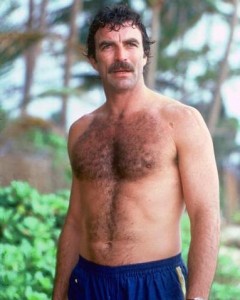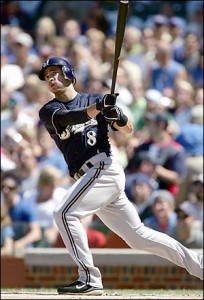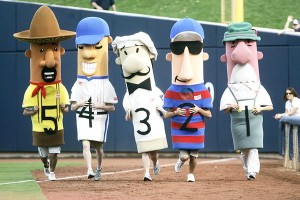By Jake McCormick
Milwaukee Brewer GM Doug Melvin is taking a page from the Batman book of rebuilding. At the end of Batman Begins, Michael Caine asked Christian Bale what the billionaire is going to do in regards to rebuilding Wayne Manor. Bale responds that he’s going to tear down the charred remains and build it exactly the way it was around the surviving foundation, with the exception of an expansion in the southeast corner.

Because of Milwaukee’s small market and a potentially small window of opportunity with the best 1-2 punch in the National League, Melvin owns the toughest GM job in the major leagues. The Brewers had one of the best offenses in the NL last year, but the pitching staff had a surplus of pudgy, gopherballers who won most of their games with a 5 IP, 5 ER stat line.
As is customary for many teams in baseball, I spent the last month and a half of the Brewers’ season trying to predict what Melvin would do with the veterans in the offseason. Many analysts and fans expected at least one resigning out of Braden Looper, Jason Kendall or Mike Cameron, but Melvin has taken the road less traveled by letting each of them go into the open waters of free agency. This has been said many times by many people: I expected to see some roster shake ups, but I never expected that.
He replaced Cameron’s glove and power bat with Carlos Gomez’s good glove and slap hitting potential, and has hinted that 23-year-old top catching prospect Matthew, I mean Jonathan, Lecroy will get a chance to start next year. That means that the oldest Brewer position player will be 28-year-old Corey Hart, and the rest of the lineup will resemble the avatars in Backyard Baseball games. This makes the late 1970s Arnold/Sly combo of Ryan Braun and Prince Fielder to de facto leaders of a very young team.
As a Brewer fan, I am happy to see some unpredictability from the GM office that once prided itself on stockpiling 33-year-old power hitting strikeout artists. At this point I’m also more than willing to sacrifice .230 veteran hitters like Popeye (Kendall) so Melvin can stockpile money to improve a painfully awful pitching staff.

Big markets in Los Angeles and New York will predictably dominate headlines as they throw money like Bret Michaels at a strip club at soon-to-be overpaid free agents. But small market moneyball in places like Milwaukee will provide much more interesting storylines to the average baseball fan because of their limited resources year in and year out.
The rest of the Brewers’ offseason will play out much like The Assassination of Jesse James by the Coward Robert Ford: You know exactly what the climax and ending will be, but you still can’t completely prepare yourself for it.
